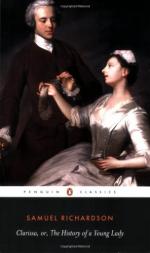But the point thus so much against her will carried, I doubt thou will see in her more of a sullen than of an obliging charmer: for, when Miss Partington was withdrawn, ’What was Miss Partington to her? In her situation she wanted no new acquaintances. And what were my four friends to her in her present circumstances? She would assure me, if ever again’ —And there she stopped, with a twirl of her hand.
When we meet, I will, in her presence, tipping thee a wink, show thee the motion, for it was a very pretty one. Quite new. Yet have I seen an hundred pretty passionate twirls too, in my time, from other fair-ones. How universally engaging is it to put a woman of sense, to whom a man is not married, in a passion, let the reception given to every ranting scene in our plays testify. Take care, my charmer, now thou art come to delight me with thy angry twirls, that thou temptest me not to provoke a variety of them from one, whose every motion, whose every air, carries in it so much sense and soul.
But, angry or pleased, this charming creature must be all loveliness. Her features are all harmony, and made for one another. No other feature could be substituted in the place of any one of her’s but most abate of her perfection: And think you that I do not long to have your opinion of my fair prize?
If you love to see features that glow, though the heart is frozen, and never yet was thawed; if you love fines sense, and adages flowing through teeth of ivory and lips of coral; an eye that penetrates all things; a voice that is harmony itself; an air of grandeur, mingled with a sweetness that cannot be described; a politeness that, if ever equaled, was never excelled—you’ll see all these excellencies, and ten times more, in this my Gloriana.
Mark her majestic
fabric!—She’s a temple,
Sacred by birth,
and built by hands divine;
Her soul the deity
that lodges there:
Nor is the pile
unworthy of the god.
Or, to describe her in a softer style with Rowe,
The bloom of op’ning
flow’rs, unsully’d beauty,
Softness, and
sweetest innocence she wears,
And looks like
nature in the world’s first spring.
Adieu, varlets four!—At six, on Monday evening, I expect ye all.
LETTER VI
Miss Clarissa Harlowe, to miss
Howe
Sunday, April 30.
[Mr. Lovelace, in his last letters, having taken notice
of the most
material passages contained in this
letter, the following extracts
from it are only inserted.
She gives pretty near the same account that he does
of what passed
between them on her resolution to
go to church; and of his proposal
of St. Paul’s, and desire
of attending her.—She praises his good
behaviour there; as also the discourse,
and the preacher.—Is pleased
with its seasonableness.—Gives
particulars of the conversation
between them afterwards, and commends
the good observations he makes
upon the sermon.]




